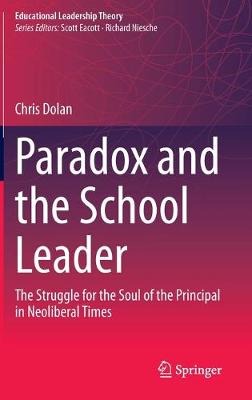Educational Leadership Theory
1 total work
This book proposes that paradox, as a theoretically rich and historically enduring concept, has significant potential for researchers in the field of critical leadership studies. By enriching its general form and infusing it with added complexity and theoretical influence, it is argued that paradox can be legitimately applied as a lens for examining and as a pedagogy for realising new learning possibilities.
The book takes paradoxes as formed out of the constitutive practices of discourse rather than as representations of conflict or complexity. Using fifteen paradoxes derived from theoretical and empirical analysis, it provides insights into the competing forces that contradict simplistic positivist accounts of contemporary school leadership and reveal the presence of a political struggle for the soul of the principal in the neoliberal era. It considers these paradoxes in three categories: (1) principal subjectivity and authority, (2) neoliberal policy and (3) managerial practice.
The book advocates critique, counter-conduct and agonistic thought and practice as resources for principals participating in such a struggle, and employs Foucault's 'care of the self' and 'practices of freedom' to promote more active involvement of principals in authoring their ethical and political selves.
The book takes paradoxes as formed out of the constitutive practices of discourse rather than as representations of conflict or complexity. Using fifteen paradoxes derived from theoretical and empirical analysis, it provides insights into the competing forces that contradict simplistic positivist accounts of contemporary school leadership and reveal the presence of a political struggle for the soul of the principal in the neoliberal era. It considers these paradoxes in three categories: (1) principal subjectivity and authority, (2) neoliberal policy and (3) managerial practice.
The book advocates critique, counter-conduct and agonistic thought and practice as resources for principals participating in such a struggle, and employs Foucault's 'care of the self' and 'practices of freedom' to promote more active involvement of principals in authoring their ethical and political selves.
